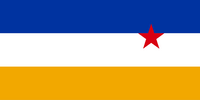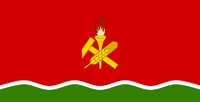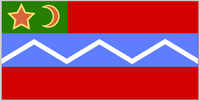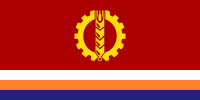Suria
 This encyclopedia article is about the country in Central Uletha. You may be looking for the collaboration page.
This encyclopedia article is about the country in Central Uletha. You may be looking for the collaboration page.
Loading map... |
Suria (Сурия), officially the Surian Confederation (Сурийская Конфедерация) or the Surian Socialist Confederation (Surian: Сурийская Социалистическая Конфедерация) is a sovereign state and a union of ten socialist republics in Central Uletha, formed in 1912 as a consequence of the September Revolution. Located in a dominant position in the middle of Uletha, Suria is one of the world’s largest and most influential nations. With an area surpassing one million square kilometres, it borders nineteen other nations and covers four major climate zones. In the north, Suria is bordered by Geklinia-Dregolesia, Dregovine, Vrašija, Zalivnia, and Mallyore, in the east by Csanádország, Ohemia, and Wiesermoria, in the west by UL13g across the Great Rift Sound, Pretannia, and Plevia, and in the south by Mardoumakhstan, UL07h, UL07f, Malësoria, UL17h, Antharia, Iviron, and the Iviran Sea. The most populous city is Radogost (Surian: Радогож), and the capital is Triglav (Surian: Триглав). Suria is a federal socialist parliamentary republic, with a Supreme Chancellor (Surian: «Верховный Председатель») acting as head of state. The head of government is the Head of Council of Ministers of Suria (Surian: «Председатель Совета Министров Сурии»), and is appointed by the legislature. Suria is the head of LABECON and a member of the Assembly of Nations.
Etymology
Suria could mean "land of harsh winds", as the adjective "surovyj" (the harsh) may formed from Proto-Velitic *sѣverъ -- "northern wind".
History
Bronze Age
Iron Age
Classical Antiquity
Late Antiquity
1st Century: The historical core of Surian land was located between the deltas of the Bakhroma and Ina rivers. Velitic tribes appeared on these lands in sixth and seventh centuries CE, however the Proto-Velites in the area were known to Triadine historians.[1]
8th Century: Suria first appeared in 858 CE when a duke named Sved (Сьвѣдъ) unified the tribes of the mouth of the River Ina and destroyed a Pretannian trading outpost. Nearby, he built a castle, naming it Mirgorod.[2]
Middle Ages
Early Modern Era
Late Modern Era
1910s: On 5 December 1911, the Great Strike began near the mines surrounding Triglav, then known as Zheleznya (Surian: Железня). It rapidly spread across the Surian Empire, lasting for nine months before the abolishment of the empire and establishment of the Surian Republic on 9 September, 1912. The Republic came about due to general poor living standards among mine workers, which was then supported by northern Surian factory workers. During the 1911/12 winter, nearly all coal mines were left abandoned, halting factories and railroads across the nation. In February 1912, trade unions in Lido and Dregolesia formed a united armed militia, forcefully capturing the cities of Mirgorod and Cheshnavisk. This militia organised its own local government independent of the Tsardom in Radogost, establishing the Universal Veche of Lido on 25 February. Internal turmoil within the new state saw the independence of the Dregovine Republic breaking away from Suria and the Veche on 25 March 1912.
In Chubuk, the Pan-Kazkay Movement declared their autonomy in March, and in April Bardash did the same. Across the nation however, many communist cells were beginning to emerge. Tsar Vladimir IV refused to respond to any of the internal unrest, instead sealing the Surian borders and began preparing the army to quell any and all uprisings. As March drew longer, the communist groups began to make themselves known, the idea of equality amongst the populace ringing true for many Surian peasants. The communists would quickly gain control across Suria, forming independent soviets.
On 1 May 1912, the Republicans crossed the Suria-Plevia border - an army of of Surian emigrants, colonists and mercenaries. It was led by representatives of the Surian emigration, who wanted to create a liberal democratic republic as opposed to the union of socialist communes. Having learned that revolutionary forces were on the approaches to Radogost an expeditionary corps was created, which was supposed to protect the interests of capital. Under the onslaught of the Republicans southwestern Suria fell, and on May 14 the Republic of Marv was created. On May 26, the Mountain Republic (modern Livadia) was established.
These breakaway states were essentially puppets that agreed to slow the Imperial troops in exchange for a better future and investments with local production. Poorly organized communes came under attack by the Republicans, and the front line stretched for several hundred kilometers. Some local councils began to organize their defense against both the Republicans and the Imperialists, and on May 26 the Berezian Republic was created, soon followed by the Zhigachev Republic on May 29. Both would soon return to Surian control. On _ May 1912, Karzalia declared independence from Suria, under the influence of the Pan-Kazkay movement.
In Chara, imperial order was still intact. At the end of May, the leader of the socialists, N.K. Tvirin, and his comrades were freed from prison by rebellious local residents, and on 1 June 1912, the Chara-Orda Republic was proclaimed - which by June 3 had extended its influence to all of Chara.[3]. Tvirin decided to undertake a campaign of the Charans and exiled socialists against Radogost. The Mountain Republic fell under the onslaught of the Tvirinans and became socialist. Osnya, which had been under the control of the republicans since June, was liberated in July.
A peace was concluded in August, when the socialists and republicans were able to agree on plans to attack Radogost. From April to the end of August 1912, Radogost was beseiged. The Radogost Republic was created on June 15 and met sometimes in Pribilov, sometimes in Tsarskaya (Bakhromskaya) Pristan. From the end of August, the suburbs of Radogost were liberated, the population of which had long since moved either to the territories occupied by the strikers or to the imperial rear.
On 9 September 1912, the royal castle in Radogost was captured, Tsar Vladimir IV deposed, and Suria proclaimed a republic. The new government was a compromise between the Socialists and Republicans. However by 1916 most members of the Republican Union had accepted socialist ideas. A split followed, after which the right-wing republicans left or were expelled from the country, and the left-wing began to be called the Radical Party. On 16 December 1916, the socialists proclaimed the Surian Socialist Federation with a capital in Ordyn'.
Meanwhile, Dregolesian and Kazkay independence was recognised by Parliament in order to raise Surian diplomatic weight and, generally, end the civil war. Republicans wanted these breakaway states to be in Surian diplomatic bloc. However, that didn't work out as Dregolesia soon decided to unify with Geklinia and in Kazkay, foreign troops were sent to protect its independence, namely Demirhanis, Kalmish, Valonians and Karolians. Kazkay would gradually surrender to Surian control until it ceased to exist in December 1916. The 1916 elections proved the outright Socialist dominance within Suria. The new cabinet sacked the ministers appointed by the Tsar, proclaimed Suria a federation and abolished post of president, forming Head Chairman as a role with candidate rotation.
On 17 December 1916, Tsar Vladimir IV and an assortment of Republicans tried to flee to Plevia, but were stopped by Plevian border guards in what became known as "The Renuncation". As they were refused entry, they retreated to a remote area of Belaja Dregovina. On 1 July 1917, the Kingdom of Zaretia was abolished and then proceeded to join with Suria. In 1920, the Karzalian Republic voted to return to Surian control. The capital city would change many times over the course of the 1910s due to rotation principle between the constituent states. From 1912-1916, power was split between Mirgorod and Ordyn'. In 1917, power was returned to Radogost, and in 1918, the capital of the Federation was in Ordyn' until it was moved to Osnya, where it remained until 1964.
1920s: By 1925, all communes were finally unified into republics, the amount of subjects of federation went down from about 50 in 1916 to 9 in 1925.
1940s: In 1942, the Bardash Republic was created, granting autonomy to the people of Bardash for the first time since their interwar period autonomous administration. Prior to this, it was a region within the Sur Republic.
1960s: In 1960, the construction of a new capital for the nation began in the Surian mountains, to be known as Triglav. In 1964, the capital was officially moved to Triglav from Osnya. In the same year, Wilhelm Schwartzfeuer - a leader of Suria - got arrested by members of the Radical Party because of his "insufficiency of getting his mandate done"[4]. As a result, another candidate from SPS stepped into power - Oleg Zalessky.
In 1964, mass anticommunist protests erupted in Drabantia. The Zalessky government ordered the military to prepare for bloody suppression, but was stopped by MPs from Radical Party that sieged the telephone hub of Osnya Parliament, switching it off. The same month, Drabantia, Beldonia and Litvania cut diplomatic relations with Suria, claiming that "they now have their own path[5]". Trade was halted completely. In March of that year, Suria was accused by the new government in the Demirhan Empire of invasion and support of their 1963 coup[6]. Suria closed its borders, preparing for war. On 29 February 1964, national Surian radio announced that Demirhani naval ships blocked access for Surian freight ships, which would lead to delays and shortages of certain goods[7]. Spring of 1964 was uneventful for Surian farmers: promised new Egalian machinery was not delievered, and the old one was already destroyed, all while shipping of foreign nutrients was stopped due to the Demirhani blockade. On 23 April 1964, government announced [8] the re-introduction of food stamps.
On 16 May, the Radical Party introduced a new Constitution at the Triglav Palace of Councils. It was drastically different from the one that was introduced under Lortzani's rule in 1941 -- almost zero mention of socialist party's role, yet a whole chapter was enshrined within on "Suria's political catechism". The constitution was labelled as "threatening" and "anti-scientific" by SPS. In the upcoming months, many newspapers published letters from workers with requests on its introduction[9][10].
As the Surian economy proceeded to ger worse and political isolation started to take hold, the population lost their confidence in the SPS government. RP-backed media figures, including famous newsreader Viktor Morkvin who agreed to read an anti-SPS pamphlet[11] during a newsreel. He was made redundant the following day, but resumed his career a few years later. The Radical Party wanted elections to happen as soon as possible. On 4 September, Party Academy sanctioned them on 5 of October.
On 5 October, new non-scheduled elections were held. Radical Party and allies won 49% of seats, while SPS and allies won 37%. An RP-supporting politician Zakhar Bogatyrev was made the Supreme Chancellor, and Oleg Zalessky was deprived of his passive elective right. On 10 October, Parliament approved a new constitution that dissolved the Confederal Assembly. The Upper House continued its work as a Confederal-level parliament, and the Lower House was re-installed as ten republican parliaments in 1965.
Present-Day: As a stable, developed nation situated in the middle of Uletha, the Confederation continues to exert its influence over its neighbouring nations, all while benefitting from tourism, foreign trade, and fishing. Suria's transport sector is the largest in the nation, with much of its exports being from exporting vehicles, transportation equipment, and from its location as a trans-continental transport hub.
Geography
 | |
|---|---|
| Geography of Suria | |
| Continent | Uletha (Central) |
| Region | Suria |
| Population | 111,478,543 (2023) |
| Area | |
| • Total | 1,917,254 km2 740,256 sq mi |
| • Water (%) | >1% |
| Major rivers | Bakhroma, Ina, Kal'va, Divitsa, Dolia |
| Time zone | WUT+05:00 (Suria Standard Time) |
Suria is located in the Suria Region of Central Uletha, consisting of varied terrain. The country's geography is greatly defined by its large mountains and thick forests, as well as its major deserts in the south-central part of the nation.
Geology
Topography
Coastal Features
Plains and Valleys
Microclimates
Natural Hazards
Earthquakes
Hydrology
Climate
Climatic conditions in Suria greatly contrast, with much of it determined by Suria's position in the central part of the continent between 40 and 55.5 degrees north (latitude). Excess precipitation is blocked from the west by the Satria Mountains, and southern tropical air masses generally do not rise above the mountains on the Iviran Coast in Chara. Across Suria, the climate is largely arid, with maximum precipitation occuring in the spring and summer seasons. In the winter, cold, dry winters complicate agriculture for most parts of Suria. The climate in Suria is continental with the exception of the north (Lido) and south (Chara) parts of the country. Coastal Chara is the only region where Suria experiences a Mesembric climate.
Much of Suria consists of natural steppe and desert zones. Deserts dominate the east, especially in the Kazkay Republic. The Aurulia Republic has a pronounced high-altitude zone, being less than 1 km above the desert. From 1 to 2 km away, dry heaths and scrub emerge, and from 2 to 3 km woodlands and alpine meadows begin to climb in altitude. In the inner Bardash Republic at the Arkhyz Mountains, mountain steppes are the dominant geographic feature with a notable lack of treecover.
The Livadia Republic, as well as the southern part of the Sur Republic, are situated in the standard steppe landscape, which becomes open woodlands and thickets at altitudes above 500m. Northern Sur Republic and the Lido Republic differ, as wetter (up to 500mm / year) climates are present. The steppe dominates here, and coniferous forests grow on the slopes of mountains. Only in the far north near the town of Mirgorod does the treeline reach sea level. Glaciers in the White Mountains begin with heights of around 2.5 km, whereas in the Arkhyz Mountains they begin at around 4 km due to extremely arid conditions.
The maximum precipitation (over 2,000mm) falls in the Charan Gondra Mountains as well as on the slopes of the Markaruk Volcano in the White Mountains. In the western part of the country, such as the Kazkay Republic, there are regions where rainfall does not occur for several years.
Biodiversity
Conservation
Government and Politics
The government of Suria operates as a federal socialist parliamentary republic, reflecting its communist history and modern reality.
Administrative Divisions
 See also: Administrative divisions of Suria
See also: Administrative divisions of Suria
Suria is divided betweem ten republics that act as autonomous states within the Federation. The national capital is Triglav in the Sur Republic, however a good chunk of governing power is concentrated in the capitals of the various republics. The biggest of them, Sur Republic∈⊾, is subdivided into Oblasts (Surian: области), and each Oblast is divided into various Communes (Surian: коммуны). There are four types of Commune: urban communes (Surian: городские коммуны), rural communes (Surian: сельские коммуны), industrial communes (Surian: промышленные коммуны), and national communes (Surian: национальные коммуны).
The Lido Republic uses Fifths (Surian: пятины) in place of Oblasts, and also replaces Communes with Poviets (Surian: поветы). The Sur Republic, in addition to administering 36 oblasts, adminsters one autonomous oblast and one oblast-level city (Radogost).





 | |
|---|---|
| Administrative divisions of Suria | |
| First-level | 10 republics |
| Second-level | 38 oblasts/regions (области) 1 autonomous oblast 6 fifths (пятины) 5 krais ? banovinas 4 naslegs 10 raions (районы) 1 autonomous republic |
| Third-level | TBD communes (коммуны), 66 poviets (поветы) |
Largest cities | |
| • Радогож (Radogost) • Миргород (Mirgorod) • Осня (Osnya) • Гумилёв (Gumilyov) • Ордынь (Ordyn' ) | 5,459,787 2,305,912 2,071,722 1,625,034 1,428,881 |
| Republic | Surian | Code | Capital | Surian | Area (km2)* | Population | Density | Urbanization |
|---|---|---|---|---|---|---|---|---|
| Bardash | Бардаш | БАР (1) | Bardash | Бардаш | 89,500 | 3,227,000 | 35,8 | 52% |
| Kazkay | Казкай | КАЗ (2) | Charbakhabad | Чарбахабад | 405,000 | 1,525,000 | 3,57 | 52% |
| Karzalia | Карзалия | КАР (3) | Zarayna | Зарайна | 88,800 | ~3,000,000 | 21,78 | 71% |
| Livadia | Ливадия | ЛИВ (4) | Sinevit | Синевит | 142,000 | 1,870,000 | 18,9 | 61% |
| Lido | Лидо | ЛИД (5) | Mirgorod | Миргород | 69 400 | 11 144 300 | 161 | 87% |
| Marv* | Марв | МАР (6) | Yarsa | Ярса | 100000 | 5200000 | 100 | 70% |
| Sur | Сур | СУР (7) | Radogost | Радогож | 785 900 | 58 564 000 | 74,52 | 74% |
| Aurulia | Аурулия | АУР (8) | Sheridan | Шеридан | 37,900 | 840,000 | 22,2 | 62% |
| Chara | Чара | ЧАР (9) | Ordyn' | Ордынь | 202 200 | 19 125 000 | 100,7 | 75% |
| Zaretia | Заретия | ЗАР (10) | Pirosmani | Пиросмани | 12 215 | 371 000 | 30 | less than 65% |
- Area are excluding the coastal waters and waters of Lake Lido.
Largest Cities
Suria is one of the most populous countries in Uletha, having combined population of 111,478,543 as of the 2023 census.
| № | City (capitals of republics bolded) |
Republic | Population (city proper) |
|---|---|---|---|
| 1 | Radogost | Sur | 5,459,787 |
| 2 | Mirgorod | Lido | 2'305,912 |
| 3 | Osnya | Sur | 2,071,722 |
| 4 | Gumilyov | Sur | 1,625,034 |
| 5 | Ordyn' | Chara | 1,428,881 |
| 6 | Lomov | Sur | 1,068,075 |
| 7 | Bardash | Bardash | 920,406 |
| 8 | Mokosh | Sur | 868,075 |
| 9 | Zarayna | Karzalia | 824,520 |
| 10 | Yedinets | Sur | 789,490 |
| 11 | Shelonsk | Lido | 766,908 |
| 12 | Triglav
|
Confederal Capital | 720,118 |
| 13 | Suzhenitsy | Chara | 744,671 |
| 14 | Charbakhabad | Kazkay | 681,808 |
| 15 | Sinevit | Livadia | 642,904 |
| 16 | Berezyan' | Sur | 617,444 |
| 17 | Babrin | Sur | 587,860 |
| 18 | Onegin | Chara | 527,309 |
| 19 | Podporozh | Sur | 519,715 |
| 20 | Blagovestye | Sur | 518,611 |
State Symbols
The Surian flag is an 12:7 banner with three horizontal stripes of blue, white and red, symbolizing hope, honesty and determination, respectively. In the middle, there is a coat of arms with a hammer, a stalk of wheat, and a torch that represents the union of working class, peasants and intellectuals.[12]
Foreign relations
Suria participated in the Second Workers' Union in 19XX-19XX, and was one of the founding members of the Assembly of Nations in 1966.
Military
Suria posesses a united Confederate Army (Конфедеративная Армия), led by a confederal Ministry of Defence. Before a change in doctrine in the 1950s, it was called The Universal Labour Army (Всемирная Армия Трудящихся).
Law enforcement
| Government of Suria | |
|---|---|
| Federal socialist parliamentary republic | |
| Capital | Триглав (Triglav) |
| Head of state | |
| • Верховный Председатель (Supreme Chancellor) | Юрий Стояновский (Yuri Stoyanovski) |
| • Председатель Совета Министров Сурии (Head of Council of Ministers of Suria) | Платон Вознесенский (Platon Voznesensky) |
| Legislature | Конфедеральный совет (Confederal Council) |
| • Upper house | Палата делегатов (House of Delegates) |
| • Lower house | Палата депутатов (House of Deputies) |
| Judiciary | Верховный Суд (Supreme Court) |
| Patron Saint of Suria | Андрей Первозванный (Saint Andrew) |
Major political parties | |
SPS Radicals Lab-Dem Artel Green PCC Egalitarians | |
| AN, LABECON | |
Executive Branch
Legislative Branch
Judicial System
Political Parties
As of 2020, Suria has six main parties that are united in one National Unity Coalition named the Party Academy (Партийная Академия). Some scholars say that the Party Academy executes the functions of "one big communist party with official parties just being the factions inside it"[13].
The parties are divided into two sub-coalitions:
Democratic Bloc (Демократический блок) is the ruling coalition. It agitates for propagation of socialist ideas over the world and rising Suria's authority on the international arena. DB cares for an equal treatment of Surian citizens and social stability. Their electorate are white collar workers, small entrepreneurs, and civil servants. DB receives most of their votes from the industrial north and south.
- Socialist Party of Suria (Социалистическая Партия Сурии) - a party formed in 1912, unifying small Rebel Socialist clubs and parties.
- Labour-Democratic Party (Трудовая Демократическая Партия) - an old Social Democratic party formed in 1890s in Lido. Defends the rights of creative class, scientists and intellectuals. Has presence in cities of Radogozh-Mirgorod population corridor.
- People's Council Cooperation (Народное Советское Сотрудничество) - a party made in 1913 by Anarchists, through the years under the influence of socialist goverment switched to syndicalist values. The party was part of Proletarian Alliance coalition from 1965 to 1994 and also has periods of unaffiliation.
- Artel Party (Партия Артелей) -- expresses support to small enterprises, labor artels and other forms of small private business initiative
Proletarian Alliance (Пролетарский альянс) is seen as a parties of mostly blue collar workers and farmers. PA keeps Suria isolated and see the country as the "last stand bulwark", trying to keep society unaffiliated with outside world's views. Unlike DB, PA is a culturally conservative coalition that differentiates the society and bases their ideology on hierarchy. PA has a strong presence in rural areas of the country and in the mountainous centre.
- Radical Party (Радикальная Партия) - a nationalist party that switched to economical left values in 1900s. Was a leading power for Republican movement in 1912.
- Egalitarians (Эгалитаристы) - a minor communist party, hardline leftist party.
There is also one unaligned party called the Green Party, formed in 1983 as a youth movement under the name "Organisation for Planet's Caretaking" ("Организация заботы о планете")[14].
Party Academy
Presence in legislature
Human rights
Economy
 | |
|---|---|
| Economy of Suria | |
| Mixed economy | |
| Currency | Surian Altyn (SUA) |
| Monetary authority | Государственный банк Сурии (State Bank of Suria) |
| GDP (PPP) | 2023 estimate |
| • Total | $4,134 trillion |
| • Per capita | $37,456 |
| HDI (2023) | very high |
| Principal exports | Heavy machinery, vehicles, transportation equipment, oil, natural gas, electricity |
| Principal imports | Various agricultural products, advanced electronics, plastic products, timber |
The economy of Suria is largely manufacturing-based, leaning heavily into producing vehicles, heavy machinery, and other transportation equipment. Alongside other resources like oil, natural gas, and electricity, the nation is a massive energy and machinery producer, supplying much of the surrounding regions with equipment and power. The Surian economy heavily influences neighbouring states, allowing for some Surian dominance in its sphere of influence.
Tourism
Agriculture and fishery
Agriculture
Fishing
Industry and services
Suria was accused of having nuclear missiles[15], however satellite imagery from FSA Armed Forces and INGCOMFOR[16] that was released in 1970s and 1980s showed otherwise -- there are no signs of nuclear test sites or nuclear warfare installed in the Confederation.
Science and technology
Infrastructure
| Infrastructure of Suria | ||||||||||||||||||||||||||||||||||||
|---|---|---|---|---|---|---|---|---|---|---|---|---|---|---|---|---|---|---|---|---|---|---|---|---|---|---|---|---|---|---|---|---|---|---|---|---|
| Roadways | ||||||||||||||||||||||||||||||||||||
| • Driving side | Right | |||||||||||||||||||||||||||||||||||
| • Minimum age | 18 (motor vehicles) | |||||||||||||||||||||||||||||||||||
| • Maximum speed | Motorway: 110km/h Urban dual: 60km/h Rural: 90 km/h Urban: 60 km/h | |||||||||||||||||||||||||||||||||||
| Railways | ||||||||||||||||||||||||||||||||||||
| • Passing side | Right | |||||||||||||||||||||||||||||||||||
| • Gauge | 1435mm | |||||||||||||||||||||||||||||||||||
| • Electrification | yes | |||||||||||||||||||||||||||||||||||
Electrical power generation | ||||||||||||||||||||||||||||||||||||
| ||||||||||||||||||||||||||||||||||||
| Mains electricity | 220 V, 50 Hz | |||||||||||||||||||||||||||||||||||
| Telephone code | +29 | |||||||||||||||||||||||||||||||||||
| Internet TLD | .su | |||||||||||||||||||||||||||||||||||
Energy
Transport
Demographics
| Demographics of Suria | |||||||||||||||||||||||||||||||
|---|---|---|---|---|---|---|---|---|---|---|---|---|---|---|---|---|---|---|---|---|---|---|---|---|---|---|---|---|---|---|---|
| Demonym | Surian | ||||||||||||||||||||||||||||||
| Official languages | Surian | ||||||||||||||||||||||||||||||
| Recognized minority languages | Kazkay, Dregolesian, Karzalian, Bardash, Antharian, Dregovinian, Plevian | ||||||||||||||||||||||||||||||
Ethnicities | |||||||||||||||||||||||||||||||
| |||||||||||||||||||||||||||||||
Religion | |||||||||||||||||||||||||||||||
| |||||||||||||||||||||||||||||||
| Literacy | |||||||||||||||||||||||||||||||
| Life expectancy | |||||||||||||||||||||||||||||||
Suria has a population of roughly 111,478,543. Suria is of majority Surian ethnicity, however the nation remains ethnically diverse with hundreds of other minority groups recognises throughout the country.
Languages
Religion
Education
Education in Suria starts from the age of seven. Attending school is mandatory from first to ninth grade. After ninth grade, one could choose between "specialized secondary education", presented in professional education facilities, or continue their schooling up to eleventh grade. Primary, secondary and tertiary education were made free. This was guaranteed by the 1975 Surian Constitution.
Health
Culture
Art and architecture
Literature and philosophy
Performing arts
Media
The only national broadcaster association in Suria is the The Union of Broadcasters and Press. It controls the news on radio, in newspapers and on the television.
Radio code for Surian broadcast stations is Sxxx.
Prior to the 1960s, Surian TV was simulcasted by isolated republican-level transmitters. A National Surian TV network was formed in 1964 with the lauching of satellite network named "Molnija(The Lightning Bolt)". It consists of two main channels: First Programme and Second Programme. Third programme is reserved for the main channels of the republics. International broadcasting is performed via satellite channel called "TSS 24".
Entertainment
Suria has NN festivals, many of which are installed on a republican level. However, there are important ones that are observed in every republic:
- 9 September - Day of the Revolution
- 31 December and 1-3 January - New Year
Holidays
Cuisine
Sports
Suria participated at following Geolympiades:
- 2016 Geolympiad in Quentinsburgh (no medals won)
See also
References
- ↑ "Chronicle of Triadine conquests". Antonius Tiberius Dinerius, circa 70 CE
- ↑ Велитская Летопись, неизвестн. автор / список боярина Грибницкого, XI век (переписано в XVI в. с дополнениями)
- ↑ "Рассказы Твирина о своей жизни и работе" - А.Лорцани / Р., изд. "Политиздат", 1940
- ↑ "О назначении т. Залесского представителем Сурии" // "Конфедерация Труда",18 ноября 1962 г.
- ↑ Drabantsky rozhlas, vysilani od 7. 1. 1964.
- ↑ "1965'te Kuzey Demirhanlı Devletinin Kurtuluşu" // Ebedi Sorular, #2/1964
- ↑ "Провокация демирханских националистов" // "Конфедерация Труда", 29.02.1964
- ↑ Утренние новости // Радио-Осня, эфир от 23.04.1964
- ↑ "Предложения трудящихся о введении радикальной конституции" // "Конфедерация Труда", 24.06, 18.07, 23.08, 25.08.1964
- ↑ "Введите конституцию радикалов!" // "Известия Верхнего Сура", 11 июля 1964 г.
- ↑ "Результаты работы СПС" // Радио-Осня, эфир от 02.09.1964
- ↑ Конституция Сурии 2001 года / Триглав, изд-во "Политиздат", 2001 г.
- ↑ "Улињачки преглед" // pages 19-20 of # 6./1979.
- ↑ Конфедеральный Бюллетень защитников природы. // №33, 1983 г.
- ↑ "Internal betrayal in Suria may result in a Greater War, experts say"// The Royal Gazette (Bai Empire), from 18 May 1965
- ↑ News at 2100 // Ingrea Telecorporation (ITC 1) // 1982, September 9
| View on map | |
| Neighbors | Antharia, Csanádország, Dregovine, Geklinia-Dregolesia, Iviron, Malësoria, Mallyore, Mardoumakhstan, Ohemia, Plevia, Pretannia, Vrašija, Wiesermoria, Zalivnia, UL07f, UL07h, UL13g, UL17h |
|---|---|
| Membership | Association of South Ulethan Nations, LABECON |
| Global topics | Airports • Businesses • Currencies • Driving side • Electricity • Intergovernmental organizations • Languages • Rail transport |
